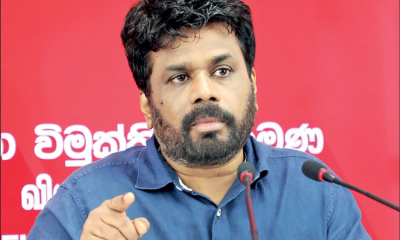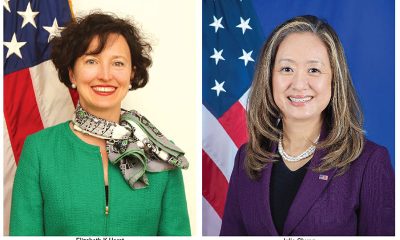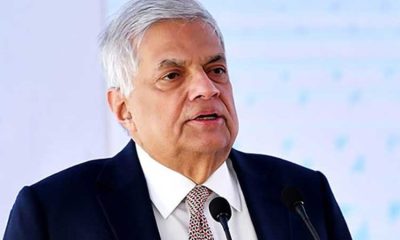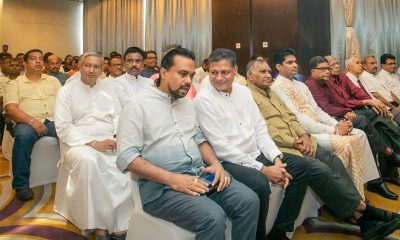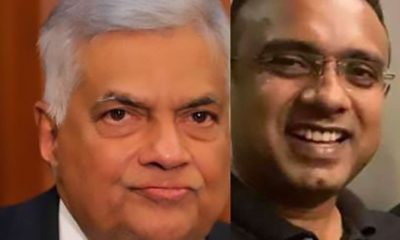Editorial
Beggars’ quarrel

Friday 28th April, 2023
Ruling party MPs and their Opposition counterparts never see eye to eye on anything other than ways and means of feathering their nests. The national interest does not figure, at all, in their scheme of things. So, it is only natural that they are clashing over the IMF bailout, which is to be put to the vote in Parliament.
President Ranil Wickremesinghe, speaking in Parliament, on Wednesday, urged all the MPs to sink their political differences and support the IMF deal, and vowed to grasp the nettle in doing what needs to be done to sort out the economy. It is heartening that he has chosen to act decisively, and one fervently hopes that he will succeed in his endeavour. Populism has been the bane of Sri Lanka’s economy, and tough decisions have to be made regardless of their political fallout to usher in economic stability.
The government’s agreement with the IMF is now a fait accompli, and there is hardly anything that the Opposition could do to effect changes thereto. Arguments for and against the IMF bailout are not based on the merits or demerits thereof. The government MPs are blindly supporting it, and the views of its critics are coloured by their political prejudices. The MPs of both sides of the House act out of expediency and not principle.
There is no way any member of the current Parliament could absolve herself or himself of the blame for the present economic crisis, which has come about due to reckless borrowing, corruption, waste and, above all, the mismanagement of the national economy over the decades. The political parties they represent have either misruled the country or supported corrupt, failed regimes. So, the onus is on these worthies to stop fighting and make a concerted effort to clean up the current economic mess they themselves have created.
The MPs’ right to support or oppose the IMF agreement or anything else for that matter cannot be questioned. But they should not lose sight of the fact that beggars are no choosers. Never do bailouts for bankrupt countries come without constricting conditions. It behoves those who oppose the IMF conditions for assistance to reveal how else they would have sought to tackle the economic crisis. Mere rhetoric will not do.
Wimal vs. Julie
US Ambassador in Colombo, Julie Chung, has sought to rubbish former Minister Wimal Weerawansa’s claim that the US and India were behind the ouster of President Gotabaya Rajapaksa, last year, and she on behalf of Washington urged Speaker Mahinda Yapa Abeywardene to take over the government, at the height of Aragalaya, albeit in vain. Weerawansa’s conspiracy theory has gone viral on the Internet.
Ambassador Chung, however, has not named Weerawansa in her response; issuing a twitter message, she has only said, “I am disappointed that an MP has made baseless allegations and spread outright lies in a book that should be labeled “fiction.” We thought she would issue a detailed response, given the severity of the allegations Weerawansa has levelled against her.
One should not be so naïve as to believe that Weerawansa’s claim at issue is the truth, the whole truth and nothing but the truth. What politicians say should be taken cum grano salis, as is public knowledge, for they are very economical with the truth, which they also stretch as if to the manner born, when they have to safeguard their interests, and the same is true of diplomats who, after all, are said to ‘lie overseas for their countries’.
Thus, it may not be advisable to draw any conclusions solely based on what Weerawansa or Ambassador Chung has said; their claims should be checked against information to be elicited from other sources if doubts anent the alleged conspiracy are to be allayed, if at all. This, we believe, is a task for Parliament, which orders probes at the drop of a hat. When an MP says that a foreign envoy approached the Speaker, and pressured him to take over as the Acting President during a popular uprising, Parliament should hold an investigation and get at the truth.
Weerawansa named names when he claimed that last year the US and India brought pressure to bear on President Gotabaya Rajapaksa to sack Prime Minister Ranil Wickremesinghe before quitting. Gamini Senarath, Secretary to the President, according to Weerawansa, sent two letters to President Rajapaksa, who was in the Maldives, for his signature; one was his resignation letter and the other was to announce the removal of Prime Minister Wickremesinghe, but Gotabaya resigned without removing the PM. It will be interesting to know what Gotabaya, Speaker Abeyewardena and Senarath have to say about Weerawansa’s allegations.
Editorial
Selective transparency

Saturday 27th December, 2025
The NPP government has released a cordial diplomatic letter from Indian Prime Minister Narendra Modi to President Anura Kumara Dissanayake, and gained a great deal of publicity for it as part of a propaganda campaign to boost Dissanayake’s image. Such moves are not uncommon in politics, especially in the developing world, where the heads of powerful states are deified and their visits, invitations and letters are flaunted as achievements of the leaders of smaller nations. However, the release of PM Modi’s letter to President Dissanayake is counterproductive, for it makes one wonder why the government has not made public the MoUs it has signed with India?
PM Modi’s Sri Lanka visit in April 2025 saw the signing of seven MoUs (or pacts as claimed in some quarters) between New Delhi and Colombo. Prominent among them are the MoUs/pacts on the implementation of HVDC (High-Voltage Direct Current) Interconnection for import/export of power, cooperation among the governments of India, Sri Lanka, and the United Arab Emirates on developing Trincomalee as an energy hub, and defence cooperation between India and Sri Lanka.
The NPP government has violated one of the fundamental tenets of good governance––transparency; there has been no transparency about the aforesaid MoUs or pacts, especially the one on defence cooperation. They cannot be disclosed without India’s consent, the government has said. This is a very lame excuse. The JVP/NPP seems to have a very low opinion of the intelligence of the public, who made its meteoric rise to power.
When the JVP/NPP was in opposition, it would flay the previous governments for signing vital MoUs and pacts without transparency. But it has kept even Parliament in the dark about the MoUs/pacts in question.
Ironically, the JVP, which resorted to mindless violence in a bid to scuttle the signing of the Indo-Lanka Accord in 1987, has sought to justify the inking of an MoU/pact on defence cooperation between Sri Lanka and India and keeping it under wraps, about three and a half decades later. The signing of that particular defence MoU/pact marked the JVP’s biggest-ever Machiavellian U-turn. How would the JVP have reacted if a previous government had entered into MoUs with India and kept them secret? It opposed the proposed Economic and Technology Cooperation Agreement (ETCA) between Sri Lanka and India tooth and nail, didn’t it?
Whenever one sees the aforesaid letter doing the rounds in the digital space, one remembers the MoUs/pacts shrouded in secrecy, which have exposed the pusillanimity of the NPP government, whose leaders cannot so much as disclose their contents without India’s consent.
Editorial
Desperate political sandbagging

Friday 26th December, 2025
There is nothing more predictable than surprise in politics. After securing a two-thirds majority in Parliament last year and emerging victorious in most local councils, this year, the JVP-led NPP may have thought that it was plain sailing. But the government now has many unforeseen, seemingly intractable issues to contend with almost on all fronts. The disaster-stricken economy is expected to slow down, with relief and rebuilding costs escalating, and the deadline for the resumption of debt repayment approaching. Vehicle imports are bound to decrease, causing a sharp drop in the government’s tax revenue. The rupee is depreciating fast. As if these were not enough, the government is experiencing serious problems on the political front.
The defeat of the NPP’s budget in the Colombo Municipal Council (CMC), which the JVP/NPP seized control of through extensive horse trading, could not have come at a worse time for the government. The same fate has befallen many other NPP-controlled local councils. Most of all, the NPP has suffered a string of defeats in the cooperative society elections countrywide during the last several months.
Desperate times are said to call for desperate measures. Cyclone Ditwah and the attendant extreme weather events that badly damaged roads, tank bunds and river banks prompted repair teams to resort to sandbag revetment. But there have been many instances where sandbag facings collapsed, unable to withstand the intensity of floods and slope failures. The government politicians who boasted of having carried out swift restoration work have been left red-faced; they have failed to assess the severity of the problems they are trying to solve.
The NPP government has resorted to a method similar to sandbag revetment in a desperate bid to consolidate its control over some local councils which cannot secure the passage of their budgets for want of majorities. Its members have gone to the extent of setting the clock forward in such institutions, meeting in advance of the regular start time and declaring their budgets passed before the arrival of the Opposition councillors. What the NPP did in the Horana Urban Council the other day is a case in point, the Opposition says.
The NPP is accused of having inflated the number of votes for its Galle MC budget amidst a howl of protests from the Opposition and declared victory. The Opposition councillors prevented the council secretary from leaving the auditorium, put the budget to a fresh vote and defeated it. The Opposition has threatened legal action against the Mayors/Chairpersons and the state officials for violating the law. The government is likely to employ a similar method to have the CMC budget passed when it is put to a vote again next week. The JVP has no sense of shame, just like all other political parties that have been in power.
All self-righteous politicians, given to moral grandstanding, lay bare their true faces when their interests are threatened, and they face the prospect of losing their hold on power. The JVP/NPP is now without any right to be critical of its rivals who did not scruple to undermine democratic principles and traditions to retain power.
Gaining control of hung local councils is one thing, but running them to the satisfaction of their members and the public is quite another. The non-majority councils that the Opposition parties have gained control of could face the same fate as the CMC. This situation has come about because the country is without patriotic leaders. Ideally, the political parties that obtained pluralities in the hung councils should have been allowed to control those institutions, and they should have adopted a conciliatory approach and sought their political rivals’ cooperation to serve the public.
The shameful manner in which the NPP acted during the Galle MC budget vote is not unprecedented. One may recall that in January 2024, the SLPP-UNP government did something similar to secure the passage of its despicable Online Safety Bill. The then Speaker Mahinda Yapa Abeywardena stooped so low as to make use of a brawl in the House and declare the Bill passed. Interestingly, the SLPP and the UNP are among those who are raking the NPP over the coals for undermining democratic principles and traditions. So much for the self-proclaimed messiahs and their critics.
Editorial
Christmas spirit, relief and pledges

Thursday 25th December, 2025
Christmas has dawned while Sri Lanka is reeling from the cumulative impact of multiple disasters which snuffed out hundreds of lives and destroyed many homes and livelihoods. It is a time of hope. Its ethos, which emphasises hope, compassion and giving, could not be more relevant in these difficult times when the task of looking after a large number of disaster victims and helping rebuild their shattered lives has become a top national priority.
Santa came here the other day, as it were. There was no magical flight of a sleigh pulled by reindeer across the night sky. Instead, a jet landed at the BIA, and out stepped Indian External Affairs Minister S. Jaishankar. He unveiled a generous disaster relief and reconstruction package from India and flew back. This noble act of giving exemplifies the spirit of Christmas as much as good neighbourliness.
The best way the Sri Lankan rulers can show appreciation for generous assistance from India and other nations is to uphold accountability, rationalise disaster relief and ensure that it is distributed in a transparent manner. There are disturbing reports about political interference with the disbursement of funds among disaster victims. A high-level probe must be conducted into these allegations.
Christmas is also the season of giving and forgiving. The irony of Minister Jaishankar meeting President Anura Kumara Dissanayake, who is also the leader of the JVP, may not have been lost on keen political observers. If the JVP had acted wisely, heeding religious tenets, and pursued its political goals without resorting to violence, in the late 1980s, tens of thousands of precious lives and state assets worth billions of rupees could have been spared. India has forgiven the JVP, which it even helped gain international legitimacy and shore up its electoral chances in the run-up to last year’s presidential election. India has also helped Sri Lanka manage its worst-ever economic crisis and the impact of natural disasters. The people of Sri Lanka have also forgiven the JVP, despite its past violence, as evident from its impressive electoral victories last year. Sadly, the JVP is not willing to forgive its political enemies. Its General Secretary Tilvin Silva himself has said so. It ought to soften its stand.
All political leaders in this country usually issue well-written Christmas messages, extolling the core Christian virtues, such as giving, forgiving, compassion and peace-making. If only they lived up to the ideals they claim to cherish, at least while the country is struggling to recover from a series of natural disasters. Unfortunately, their post-disaster political battles are intensifying apace, and one wonders whether their focus is actually on helping disaster victims or furthering their political interests. They are not willing to sink their political differences for the sake of the disaster victims crying out for relief.
Meanwhile, the government leaders ought to go beyond issuing Christmas messages if they are to prove that they actually care about the believers in Jesus Christ. They ought to fulfil their pledge to serve justice for the victims of the Easter Sunday terror attacks (2019), which claimed more than 275 lives.
About seven years have elapsed since that tragedy which could have been prevented if the then government had heeded intelligence warnings, and the country has had four Presidents and three governments. But the promises made by the political leaders to bring the masterminds behind the Easter Sunday carnage to justice have gone unfulfilled. Those who are desperately seeking justice pinned their hopes on the current leaders who vowed to trace and prosecute the terror masterminds expeditiously.
The present-day leaders, too, have chosen to remain silent on their promise at issue; they are impervious to calls for justice, just like their predecessors. Let fulfilling their pledge to serve justice for the Easter Sunday terror victims be one of their Christmas resolutions.
-

 News4 days ago
News4 days agoMembers of Lankan Community in Washington D.C. donates to ‘Rebuilding Sri Lanka’ Flood Relief Fund
-

 News2 days ago
News2 days agoBritish MP calls on Foreign Secretary to expand sanction package against ‘Sri Lankan war criminals’
-

 Business6 days ago
Business6 days agoBrowns Investments sells luxury Maldivian resort for USD 57.5 mn.
-

 News5 days ago
News5 days agoAir quality deteriorating in Sri Lanka
-

 News5 days ago
News5 days agoCardinal urges govt. not to weaken key socio-cultural institutions
-

 Features6 days ago
Features6 days agoHatton Plantations and WNPS PLANT Launch 24 km Riparian Forest Corridor
-
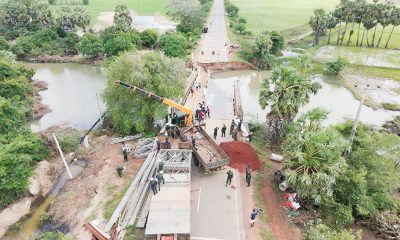
 Features6 days ago
Features6 days agoAnother Christmas, Another Disaster, Another Recovery Mountain to Climb
-

 Features4 days ago
Features4 days agoGeneral education reforms: What about language and ethnicity?


